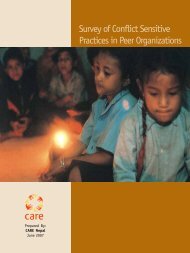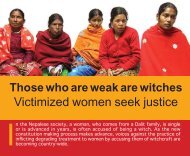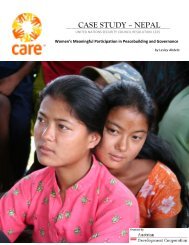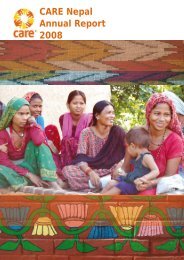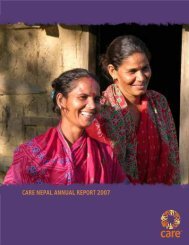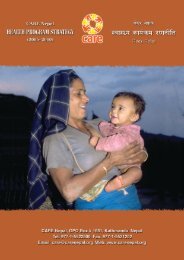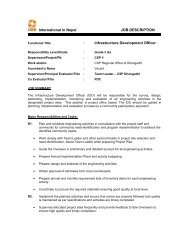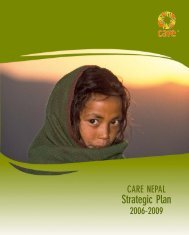Untitled - Care Nepal
Untitled - Care Nepal
Untitled - Care Nepal
Create successful ePaper yourself
Turn your PDF publications into a flip-book with our unique Google optimized e-Paper software.
“He is the one who supports her in the time<br />
of joy and sorrow (suckh and dukh)”. So<br />
women consider husband as God. The<br />
daughter is sacredly offered by her parents<br />
(kanya daan) to her husband during wedding<br />
so that usually women keep them in the<br />
place of God.<br />
Communities that are dominated by<br />
Brahmin’s practice traditional beliefs.<br />
Women of Brahmins and Chettri believe<br />
husbands as God. In better off families<br />
where women are completely dependent<br />
on men consider men as God whereas in<br />
Dalit families this belief is not very strong.<br />
In poor families both men and women<br />
work and earn equally therefore hierarchy<br />
is not as strong as in Brahmin and Chetris.<br />
Janajati’s also find themselves liberal than<br />
Brahmin and Chettri.<br />
Girls and women are expected to work<br />
inside the house and in the farm. Girls are<br />
not allowed to participate in any groups<br />
meetings etc. Outside work is done<br />
similarly by men and women in poor<br />
families. But the household work is only<br />
carried out by women. In big families<br />
women has to do more work. If the<br />
members of family are educated, they offer<br />
some support to women. Educated men<br />
have more exposure than others hence they<br />
support their women. Increasingly some<br />
report of sharing household workload.<br />
Women of Brahmin and Chettri have more<br />
work load than women of Janapati because<br />
their mobility is restricted whereas mobility<br />
of Janajati is not restricted. Janjatis are freer<br />
than to B/C women and girls. In Janajati magar<br />
community if the husband dies, the wife<br />
comes back to her parent’s family and happily<br />
wedded away with another man which is<br />
not practiced in brahmin chettri community.<br />
Generally it was found that a man of family<br />
member has observed the girls and women<br />
sexually harassed by men of offices and basic<br />
service delivery centers and therefore they<br />
do not want to send their sisters and<br />
daughters outside the house alone.<br />
In addition, girls are prevented to get<br />
education thinking that they are going to<br />
the other’s home (chori manche aruko ghar jane<br />
jat ho) and have to do household work there.<br />
Therefore, it was thought that education is<br />
not compulsory for girls.<br />
Local business of alcohol is high; it also<br />
raises physical and mental tension in<br />
families. When drunk men demonstrate<br />
aggressive behavior. They start beating their<br />
wives and are not willing to listen to anyone.<br />
Alcohol is taken as a bigger problem for<br />
women than the political conflicts taking<br />
place in Terai. Dalit and Janajati women brew<br />
alcohol at home to generate family income<br />
but it is consumed by Dalit Janajati and<br />
brahmin chettri. The women of Dalit and Janajati<br />
consume alcohol and fight between<br />
themselves generating further tensions in<br />
the family. Alcohol consumption in men<br />
has raised multiple family level tensions.<br />
Women share their problems and feeling<br />
with best friends of neighbors and their<br />
sisters. Very few women share their feelings<br />
openly with their husbands.<br />
Psychosocial Issues of<br />
Women affected by conflict<br />
39



